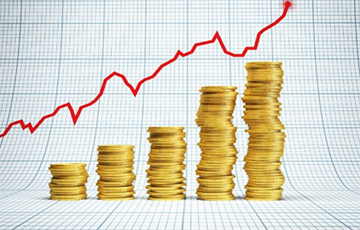Economist: Inflation Accelerating In Belarus
- 11.04.2025, 8:24
- 3,546

This process is ‘accelerated’ by three factors.
In March, annual inflation in Belarus, according to the National Statistics Committee, reached 5.9%, while monthly inflation - 0.8% against February. Food products went up most of all in March - by 1.2% against February and by 7.5% against March last year.
Non-food products rose in price by 0.4% for the month and by 3.2% for the year. Prices for services increased by 0.5% on average in March and by 6.6% by March 2024.
What influences the acceleration of inflation, and will the authorities' forecast that inflation will not exceed 5% at the end of the year come true? Economist Anatol Kharytonchyk, Senior Researcher at BEROC, explained this in his commentary to Filin.
- Inflation is gradually accelerating, but not dramatically, - says the economist. - If we remove the influence of seasonality and look at how prices rose from December to March and raise this increase to the twelfth degree (this is the annualised inflation rate), this figure will exceed 7%. In the previous quarter it was around 5%. That is, inflation is gradually increasing.
The acceleration of inflation is influenced by all the same factors as before, notes the economist. They are excess demand in the Belarusian economy, deficit in the labour market and high inflation in Russia.
- There's no data on GDP for March, but according to the first two months, we can say that excess demand has increased over the quarter. That is, the overheating of the economy has returned to the scale it was in the middle of last year. This is putting pressure on producers' costs, because businesses are working at breakneck speed.
As for the deficit in the labour market, there is no progress in reducing it. Besides, we see that wages in real terms continue to grow at extremely high rates. This is putting pressure on labour costs.
Also, inflation in Russia remains high - in the first quarter it was 10%. And if in the second half of the last year the acceleration of inflation was restrained by the strengthening of the Belarusian ruble against the Russian ruble, now there is no such restraint: at the beginning of the year the Belarusian ruble weakened against the Russian ruble.
In addition, notes the economist, non-basic inflation has increased. In the first quarter, the government raised prices for housing and utilities and communications more than the usual seasonal norm. Petrol prices have also risen, and in the second quarter the cost of public transport services will also increase.
In addition, inflationary overhang is accumulating in our country due to price regulation. According to the expert, this overhang is a potential for accelerated price growth in the future, if the price control is still significantly weakened.
All these pro-inflationary factors, summarises Kharytonchyk, will persist. If we forecast inflation for the current year, the economist believes that it will be in the range of 6-8%.
- This range is due to the uncertainty of changes in the price control system. It is not known to what extent it will be relaxed. The baseline scenario assumed a gradual easing. And the measures taken by the government in early April, in general, fit into it. Now a third of commodity items have been taken out of regulation, but in fact their share in the consumer basket is only about 10%. I think that price control will be weakened at a slow pace and further.
At the same time, according to Kharytonchyk, inflation may approach the upper limit of his forecast (which is 8%) due to the new policy of the National Bank.
- Judging by Halouchanka's statements, the National Bank is changing its orientation and becoming even more tolerant to inflation risks, even more resistant to overheating of the economy and more dependent on the government.
And it appears that the National Bank intends to influence banks to increase long-term lending to firms by lowering lending rates and policy recommendations on the volume of lending.
This means that monetary conditions may turn out to be somewhat softer than the past baseline scenario suggested. And it would mean that the correction in excess demand could be longer than in the previous forecast. Accordingly, inflationary pressures will be maintained, and taking this factor into account, I think inflation could be closer to 8%.
At the same time, there are many uncertainties that can also affect inflation in our country. For example, if the world economy gets a powerful inflationary impulse from the escalation of the tariff confrontation, which Donald Trump has started, the impact of the external sector on prices in Belarus will be stronger. Then inflation may reach 10% or more, because in such conditions the government is likely to loosen price controls faster.
The other factors of uncertainty I have already voiced. These are the actions of the National Bank - if it starts to soften monetary policy, then there is a risk of significant overheating, and inflation will be even higher.
Another factor is the price regulation itself. It is not clear how quickly it will be relaxed.











